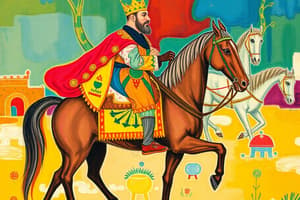Podcast
Questions and Answers
Which of the following Sufi scholars is known for advocating religious tolerance?
Which of the following Sufi scholars is known for advocating religious tolerance?
- Baba Farid Shakar Ganj
- Lal Shahbaz Qalandar (correct)
- Ali Bin Usman Hajveri
- Moinuddin Chishti
What led to the decline of the Lodhi Dynasty?
What led to the decline of the Lodhi Dynasty?
- Sufis gaining influence in politics
- Ibrahim Lodhi's autocratic rule and conflicts with nobles (correct)
- Conflicts with Hindu rulers
- Bahlul Lodhi's expansion of territory
Who was the founder of the Lodhi Dynasty?
Who was the founder of the Lodhi Dynasty?
- Babur
- Sikander Lodhi
- Ibrahim Lodhi
- Bahlul Lodhi (correct)
What is a significant characteristic of Sufism?
What is a significant characteristic of Sufism?
What significant action did Mahmud of Ghazni take against non-Islamic sites?
What significant action did Mahmud of Ghazni take against non-Islamic sites?
Which of the following is NOT a product brought by the Ghaznavids from China to the Subcontinent?
Which of the following is NOT a product brought by the Ghaznavids from China to the Subcontinent?
What major battle marked the end of the Lodhi Dynasty?
What major battle marked the end of the Lodhi Dynasty?
What was the outcome of Muhammad of Ghor's first Battle of Tarain in 1191 CE?
What was the outcome of Muhammad of Ghor's first Battle of Tarain in 1191 CE?
Which event marked the beginning of the Khilji Dynasty?
Which event marked the beginning of the Khilji Dynasty?
How did the Khilji dynasty expand its empire?
How did the Khilji dynasty expand its empire?
What led to the fall of the Mamluk dynasty?
What led to the fall of the Mamluk dynasty?
Why was Ala-ud-din Masud considered a weak Sultan?
Why was Ala-ud-din Masud considered a weak Sultan?
What was one significant outcome of Alla-ud-din Khilji's reign?
What was one significant outcome of Alla-ud-din Khilji's reign?
Flashcards are hidden until you start studying
Study Notes
Mahmud’s & Ghaznavid’s achievements
- Mahmud of Ghazni destroyed non-Islamic sites as a military tactic.
- The destruction of the Kesava Deo temple in 1017 CE in Maratha, and the destruction of the idol at the Somnath temple in 1025 CE are examples of his tactics.
- The Ghaznavids facilitated the trade of gunpowder, tea, paper, and fine pottery between China and the Subcontinent.
- The Ghaznavids brought cotton, sugar, spices, and perfumes from the Indian subcontinent to China and Europe.
The Achievements Of GHORI’S
- Muhammad of Ghor is recognized as a notable military leader.
- His military expeditions to India were designed to expand his influence in the region.
- Muhammad of Ghor was defeated in the first battle of Tarain in 1191 CE.
- He returned the following year and secured victory against the Rajputs at the second battle of Tarain in 1192 CE.
- This battle is considered one of the most impactful in South Asian history.
The Rise of Slave
- The Mamluk dynasty was a powerful military force originating from the Abbasid Caliphs.
- The Mamluk dynasty consisted of slaves who held positions of power and political influence within the Delhi Sultanate.
- Iltutmush, a member of this group, played a crucial role in the administration of the Delhi Sultanate.
- Bahram's successor, Ala-ud-din Masud, served as Sultan for a brief period and lacked real power.
- His poor lifestyle and excessive drinking contributed to his removal.
The Fall of Mamluk Dynasty
- Balban's successor, Muiz ud-Din Salquabad, ruled for a short period from 1287-1290.
- He was murdered by Jalal ud-Din Firoz Khilji, his chief general who also murdered his son.
- This event marked the beginning of the Khilji dynasty.
The Rise of Khilji Dynasty
- Jalal ud din Khilji seized power and expanded the empire through military conquests.
- Alla ud din Khilji's conquest of South India under the Khilji dynasty marked a significant expansion of the Delhi Sultanate.
The Fall of Khilji Dynasty
- Alla ud-din's death triggered internal conflicts and instability.
- Weak rulers, such as Qutubuddin Mubarakshah, contributed to the decline of the dynasty.
- The Khilji empire was ultimately brought to an end by Ghazi Malik, who later became Ghiyass ud din Tughlaq.
The Lodhi’s Dynasty (1451-1526)
The Rise of Lodhi Empire
- Bahlul Lodhi, the founder of the Lodi Dynasty, strengthened the Sultanate and extended its control over northern India.
- His successors, Sikander Lodhi and Ibrahim Lodhi, continued to manage the empire.
The Fall of Lodhi’s Dynasty
- Ibrahim Lodhi's autocratic rule and conflicts with nobles weakened the dynasty.
- His defeat by Babur at the Battle of Panipat in 1526 marked the end of the Lodhi Dynasty and established the Mughal Empire.
Sufism
- Sufis practiced a mystical approach to religion.
- Their approach to searching for and pleasing Allah was more open compared to traditional religious practices.
- Their inclusive perspective allowed people to embrace Islam and convert, despite their practices potentially contradicting traditional beliefs.
Key Sufi Scholars
- Ali Bin Usman Hajveri (1009-c.1072/1076)
- Known for his writings on Sufism, expertise in legal matters, and wide-ranging intellectual perspectives.
- Moinuddin Chishti (1142-1236 CE)
- A Persian preacher and scholar from Sistan who traveled to promote the influential Chisti order.
- Bahauddin (c.1170-1262)
- A Sunni scholar and poet who was a Sufi saint, born in Multan, Punjab.
- Lal Shahbaz Qalandar (1177-1274)
- A multilingual scholar, poet, and saint known for advocating religious tolerance, earning the name "Lal."
- Baba Farid Shakar Ganj (c 1179-1266 CE)
- A Punjabi Sufi preacher who traveled to Delhi to study under the Sufi Master, Qutbuddin Bakhtiyar Kaki.
- Nizamuddin Aulia (1238-1325)
- A Sunni and Sufi Scholar of the Chisti Order. Believed that love was the key to reaching Allah.
Studying That Suits You
Use AI to generate personalized quizzes and flashcards to suit your learning preferences.




